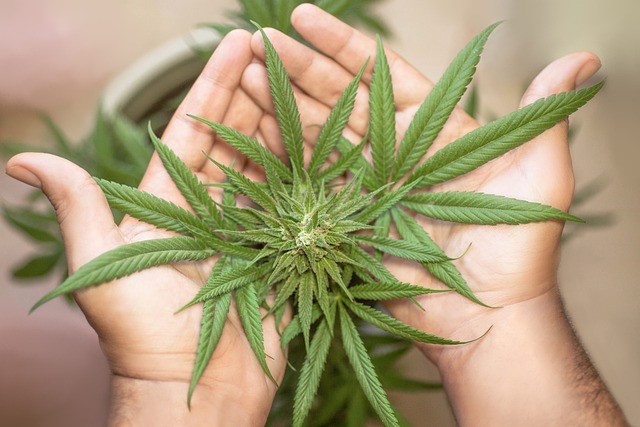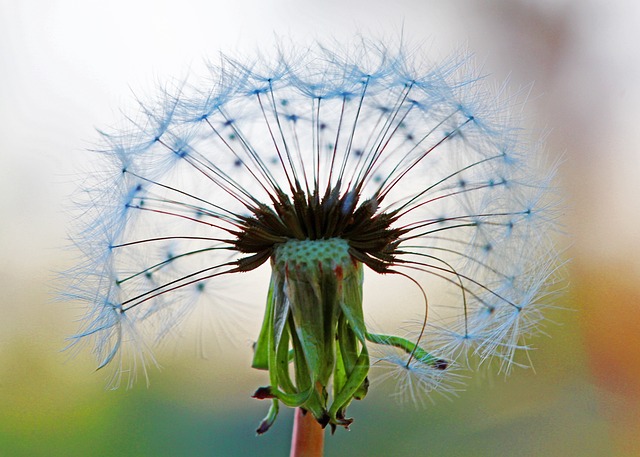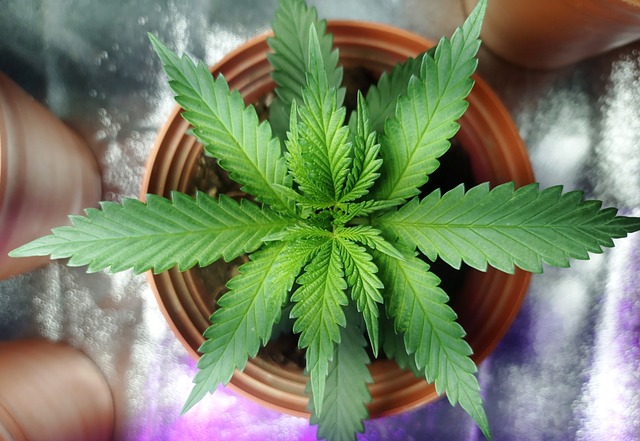In Kansas, THCA (Tetrahydrocannabinolic Acid), a non-psychoactive cannabinoid present in raw cannabis plants, has been legally distinguished from its psychoactive counterpart THC. The state's regulations, informed by the 2018 Farm Bill, permit the possession and use of THCA-rich products as long as they contain less than 0.3% THC on a dry weight basis. This legal distinction allows for the consumption of THCA flower without psychoactive effects, provided it is sourced from compliant, hemp-derived sources. The Kansas Department of Health and Environment has established clear guidelines to navigate this new terrain, emphasizing the importance of adhering to both state and federal regulations in the evolving market for THCA products. Consumers and businesses must stay informed as these laws continue to develop, ensuring compliance and safety. The inclusion of THCA in wellness products underscores its growing recognition, with ongoing research exploring its potential health benefits, including anti-inflammatory, neuroprotective, and analgesic properties. However, users should be aware of mild side effects associated with THCA, such as dry mouth and red eyes, and consult healthcare professionals for any health concerns. The legal status of THCA in Kansas remains a nuanced aspect of the state's broader cannabis legislation, highlighting the need for a clear understanding of local regulations to ensure compliance with the law.
Exploring the nuanced implications of THCA flowers within the legal framework of Kansas, this article delves into the cannabinoid’s status, effects, and potential side effects. With a focus on understanding how THCA fits into the broader landscape of cannabis compounds and its role in human health, we dissect the latest research, consumer experiences, and expert opinions to shed light on the non-psychoactive cannabinoid’s therapeutic benefits and risks. As THCA gains traction for its medicinal properties, this piece also navigates the complexities of its legality across states, emphasizing Kansas’ unique stance on the matter. Whether you’re a curious consumer or a policy maker, this article provides essential insights into the world of THCA flowers, ensuring informed decision-making within their legal boundaries.
- ThCA Flower and Its Presence in Kansas Law
- Understanding THCA: The Non-Psychoactive Cannabinoid
- Potential Side Effects of THCA Flower Consumption
- Legal Landscape for THCA Flowers in Kansas
ThCA Flower and Its Presence in Kansas Law

In the context of cannabis derivatives, THCA or Tetrahydrocannabinolic Acid is a non-psychoactive precursor to the well-known compound THC. Its legal status has been a subject of interest, particularly in states with varying degrees of cannabis legality. Kansas, situated in the Midwest region of the United States, has a nuanced stance on cannabis and its derivatives. As of recent updates to Kansas law, THCA is legally recognized within certain parameters. The Kansas Department of Health and Environment has specific guidelines that categorize THCA as a legal cannabinoid, provided it contains less than 0.3% delta-9-THC, the psychoactive component of cannabis that causes a high. This legislative distinction allows for the use and possession of THCA flower within the confines of these regulatory limits, catering to individuals seeking the potential wellness benefits associated with this compound without the psychoactive effects.
Navigating the legal landscape surrounding THCA in Kansas requires a clear understanding of both state and federal regulations. The 2018 Farm Bill paved the way for such derivatives to be legal at the federal level if they meet specific criteria. Kansas, adhering to this legislation, has established its own set of rules that align with the broader legal framework. It’s important for consumers and businesses alike to stay informed about these regulations as they evolve, ensuring compliance and safety in the use of THCA flower within state lines. The presence of THCA in Kansas law signifies a significant step towards a more comprehensive approach to cannabis regulation, reflecting a growing recognition of the diverse roles that cannabinoids can play in health and wellness.
Understanding THCA: The Non-Psychoactive Cannabinoid

THCA, or tetrahydrocannabinolic acid, is a natural cannabinoid found in the cannabis plant that has garnered attention for its potential wellness benefits. Unlike its well-known derivative THC, THCA does not possess psychoactive properties, making it an appealing option for individuals seeking the therapeutic effects of cannabinoids without the mind-altering experience. As of the current understanding, the legal status of THCA-rich products varies across different regions and states within the United States. In Kansas, for instance, the legality of THCA is a point of nuance within the broader context of cannabis laws. While hemp-derived products containing less than 0.3% THC are federally legal under the 2018 Farm Bill and by extension in Kansas, the state’s regulations may specifically address the sale and use of cannabinoids like THCA. It’s crucial for consumers to stay informed about the evolving legal landscape as it pertains to these compounds.
Research into THCA has revealed promising indications of its potential health benefits, which include anti-inflammatory, neuroprotective, and analgesic properties. Studies suggest that THCA may offer relief from various ailments without the psychoactive effects associated with THC. As such, it’s being explored as an alternative for conditions where traditional treatments may not be suitable or effective. The non-psychoactive nature of THCA has also led to its inclusion in a variety of wellness products, including oils, capsules, and topicals, which are available in states like Kansas where such products are legal. As the scientific community continues to investigate the full scope of THCA’s effects, consumers and policymakers alike are paying close attention to both the health implications and the regulatory challenges that come with this unique cannabinoid.
Potential Side Effects of THCA Flower Consumption

Consumers exploring the potential benefits of THCA flower, the raw form of tetrahydrocannabinolic acid, should be aware of its side effects. THCA is a non-psychoactive precursor to THC and has been gaining attention for its therapeutic properties. While it lacks psychoactive effects, individuals may still experience certain side effects upon consumption. These can include dry mouth and red eyes, which are common with cannabis use in general. Additionally, some users may report dizziness or feelings of anxiety, particularly at higher doses. It’s worth noting that individual sensitivity to THCA can vary, influencing the severity and type of side effects experienced.
In the context of legal considerations, it’s important to recognize that while THCA flower is legal in Kansas, its sale and possession are subject to state regulations. These regulations define acceptable levels of THC and specify that hemp-derived products with less than 0.3% THC are legal. Consumers should always ensure they are purchasing from reputable sources that comply with these laws. Engaging in responsible consumption and understanding the side effects can contribute to a positive experience with THCA flower. As with any substance, individuals should consult healthcare professionals if they have concerns about potential interactions or adverse effects.
Legal Landscape for THCA Flowers in Kansas

In recent years, the legal status of THCA (Tetrahydrocannabinolic Acid) flowers has been a topic of interest and confusion within the state of Kansas. As of the current understanding, THCA, which is non-psychoactive and found in raw cannabis plants, occupies a nuanced position under Kansas law. While Kansas has specific laws regarding cannabis and its derivatives, THCA flowers have not been explicitly criminalized. This ambiguity stems from the fact that THCA itself does not possess the psychoactive properties of its decarboxylated form, THC (Tetrahydrocannabinol), which is illegal in Kansas unless it is derived from an approved industrial hemp program and contains less than 0.3% THC on a dry weight basis.
Navigating the legal landscape for THCA flowers in Kansas requires a careful distinction between raw cannabis materials that contain THCA and processed cannabis products that may have converted THCA to THC through heating or other processes. Users and lawmakers alike are cautioned to consider the 2018 Farm Bill, which legalized hemp-derived products, including those containing THCA, at the federal level. However, state laws can be more restrictive, and it is imperative for individuals to stay informed on the most current statutes as interpretations and enforcement of these laws can vary. It is thca legal in Kansas to possess and use raw cannabis flowers that contain THCA, but any processing that converts THCA to THC may inadvertently place the resulting product within the purview of Kansas’s controlled substances act. As such, consumers and businesses dealing with THCA flowers in Kansas must proceed with caution and seek clarification from legal counsel to ensure compliance with both state and federal regulations.
In recent times, the legal landscape surrounding THCA flowers has become increasingly clarified within the state of Kansas, as outlined in our exploration of ‘ThCA Flower Side Effects.’ The article delved into the complexities of THCA, a non-psychoactive cannabinoid found in hemp and cannabis plants, and its status under Kansas law. It is evident that consumers must remain informed about the potential side effects associated with THCA flower consumption, which can range from mild to severe, depending on individual sensitivity and dosage. As per the legal clarifications provided, those interested in exploring the benefits of THCA should do so within the bounds set forth by local regulations. In light of this information, it is clear that both users and policymakers must navigate the nuances of THCA legality in Kansas with care and due diligence. Stay informed on the evolving legalities and health considerations surrounding THCA to make responsible choices.
